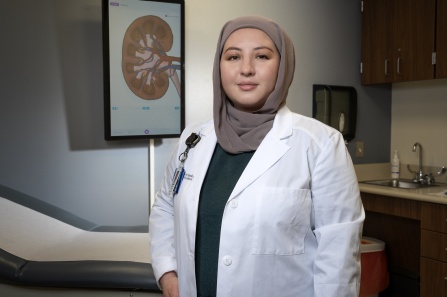How to Choose a Urology Residency

Salma Attai, MD, knows it’s crucial to pick a program that boasts talented faculty members, first-rate training sites and a culture of excellence.
If you’re looking for the opportunities, resources and support you need to develop as a urologist, we recommend looking for a program with 6 specific attributes.
Top Characteristics of Superior Residencies
1. Multiple clinical sites
Your rotations should situate you in disparate clinical settings that enable you to treat a broad patient base, become familiar with different electronic medical record systems and learn a variety of protocols for delivery of care.
Confirm that your program’s training settings will expose you to robotic surgery and the full spectrum of urologic services.
2. Solid reputation
You can identify a high quality residency by investigating its:
- Curriculum: Will you have a rounded training experience? Does your program offer enough surgical experience? Choose a program that exposes you to everything from robotic surgical procedures to laparoscopic and “open” surgical procedures.
- Research: Ensure your program offers adequate resources to conduct research and holds research conferences.
- Alumni: Your program’s graduates should be enjoying successful academic and clinical careers.
3. Supportive mentors
Quality mentoring is a key element of a strong residency. Select a program that ensures you’ll receive personal attention from attending physicians.
4. Leadership experience
Ensure that your program gives you plenty of opportunities to gain leadership experience. You should have chances to guide medical students and other residents during many of your rotations.
5. Large selection of didactic conferences
Look for a residency that requires you to attend more than three or four conferences and lectures. Your conferences should cover key areas such as morbidity and mortality, surgical skills and basic science. You should also have opportunities to attend grand rounds and participate in journal club sessions that keep you informed about current urologic research.
6. Comfortable living environment
Our residency is located in a city that boasts:
It’s important you feel at home both in and outside of your training program. Avoid applying for urology residencies in cities that fail to meet your living needs.




